Strategic Analysis of DHL: PESTEL, Porter's Five Forces, VRIO, SWOT
VerifiedAdded on 2021/02/21
|13
|6174
|21
Report
AI Summary
This report offers a comprehensive analysis of DHL's business strategy, examining its approach to achieving competitive advantage in the global logistics market. It begins with an introduction to business strategy and an overview of DHL, a leading logistics company. The report then delves into a macro-environmental analysis using the PESTEL framework to assess political, economic, social, technological, environmental, and legal factors influencing DHL's operations. Following this, a micro-environmental analysis is conducted using Porter's Five Forces to evaluate the competitive landscape and identify potential threats and opportunities. The report further explores strategic frameworks, including value chain analysis, VRIO model, and SWOT analysis, to assess DHL's internal capabilities and external environment. The analysis covers DHL's strengths, weaknesses, opportunities, and threats, providing insights into its strategic choices and market position. The report concludes by summarizing DHL's strategic approach and its implications for the company's future.
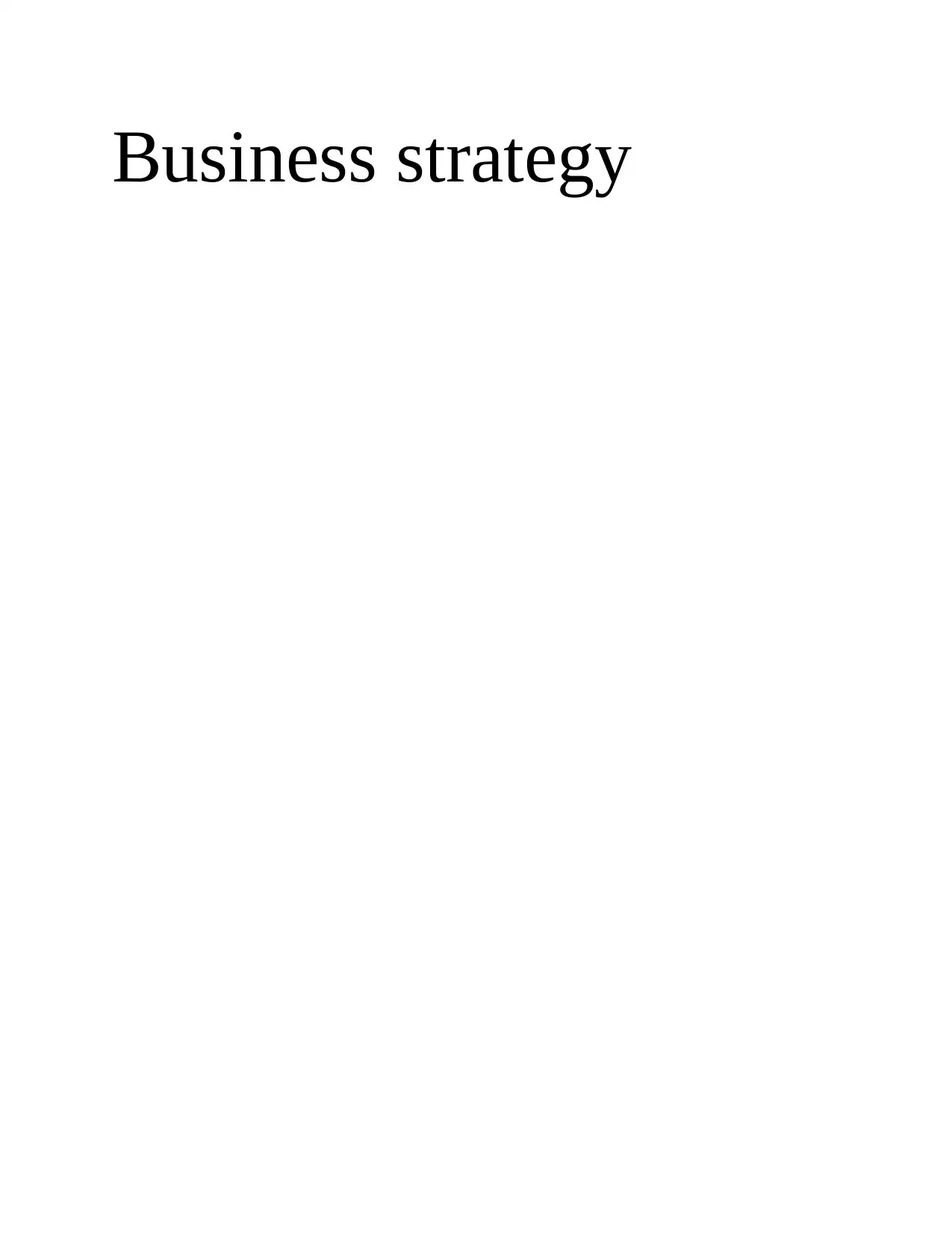
Business strategy
Paraphrase This Document
Need a fresh take? Get an instant paraphrase of this document with our AI Paraphraser
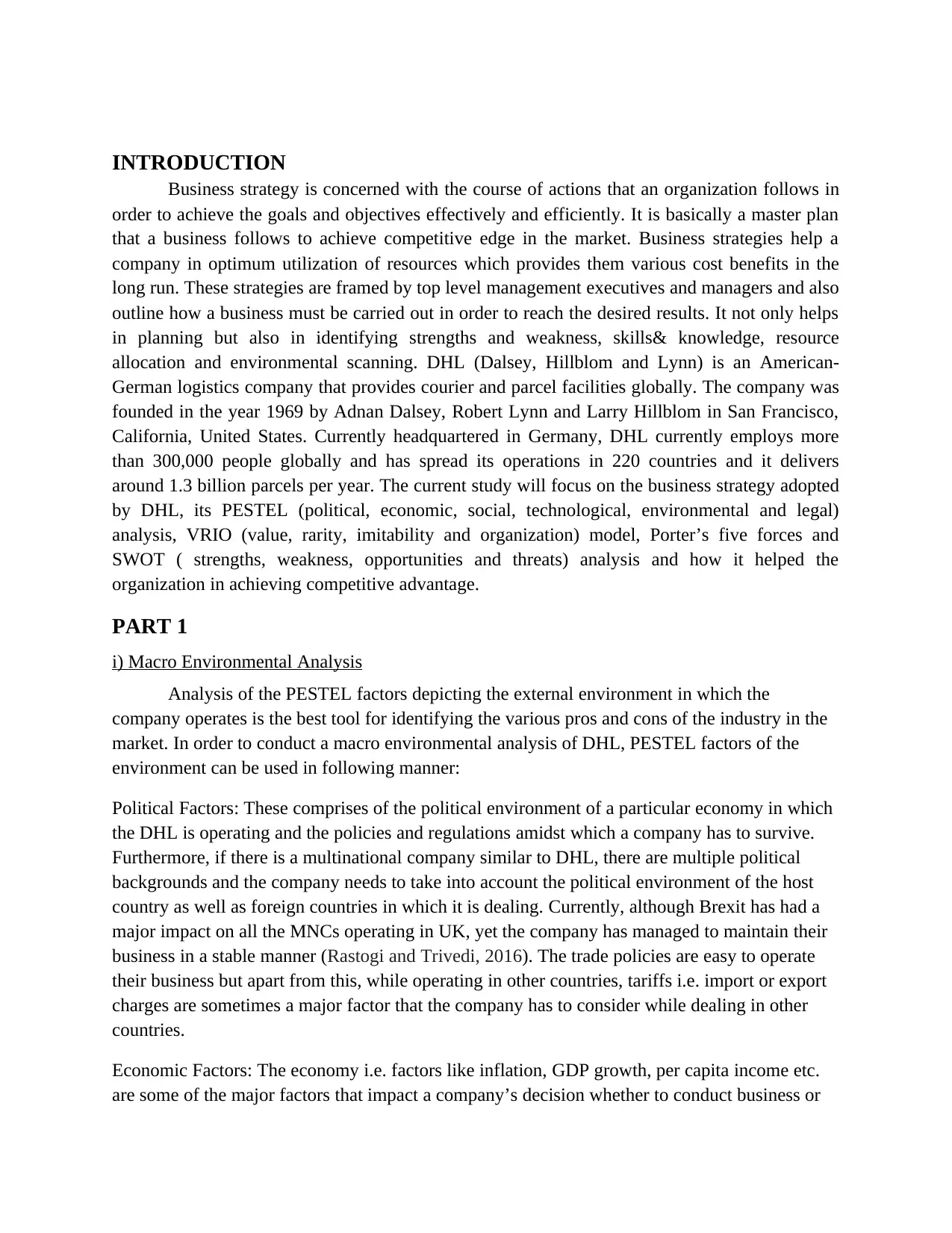
INTRODUCTION
Business strategy is concerned with the course of actions that an organization follows in
order to achieve the goals and objectives effectively and efficiently. It is basically a master plan
that a business follows to achieve competitive edge in the market. Business strategies help a
company in optimum utilization of resources which provides them various cost benefits in the
long run. These strategies are framed by top level management executives and managers and also
outline how a business must be carried out in order to reach the desired results. It not only helps
in planning but also in identifying strengths and weakness, skills& knowledge, resource
allocation and environmental scanning. DHL (Dalsey, Hillblom and Lynn) is an American-
German logistics company that provides courier and parcel facilities globally. The company was
founded in the year 1969 by Adnan Dalsey, Robert Lynn and Larry Hillblom in San Francisco,
California, United States. Currently headquartered in Germany, DHL currently employs more
than 300,000 people globally and has spread its operations in 220 countries and it delivers
around 1.3 billion parcels per year. The current study will focus on the business strategy adopted
by DHL, its PESTEL (political, economic, social, technological, environmental and legal)
analysis, VRIO (value, rarity, imitability and organization) model, Porter’s five forces and
SWOT ( strengths, weakness, opportunities and threats) analysis and how it helped the
organization in achieving competitive advantage.
PART 1
i) Macro Environmental Analysis
Analysis of the PESTEL factors depicting the external environment in which the
company operates is the best tool for identifying the various pros and cons of the industry in the
market. In order to conduct a macro environmental analysis of DHL, PESTEL factors of the
environment can be used in following manner:
Political Factors: These comprises of the political environment of a particular economy in which
the DHL is operating and the policies and regulations amidst which a company has to survive.
Furthermore, if there is a multinational company similar to DHL, there are multiple political
backgrounds and the company needs to take into account the political environment of the host
country as well as foreign countries in which it is dealing. Currently, although Brexit has had a
major impact on all the MNCs operating in UK, yet the company has managed to maintain their
business in a stable manner (Rastogi and Trivedi, 2016). The trade policies are easy to operate
their business but apart from this, while operating in other countries, tariffs i.e. import or export
charges are sometimes a major factor that the company has to consider while dealing in other
countries.
Economic Factors: The economy i.e. factors like inflation, GDP growth, per capita income etc.
are some of the major factors that impact a company’s decision whether to conduct business or
Business strategy is concerned with the course of actions that an organization follows in
order to achieve the goals and objectives effectively and efficiently. It is basically a master plan
that a business follows to achieve competitive edge in the market. Business strategies help a
company in optimum utilization of resources which provides them various cost benefits in the
long run. These strategies are framed by top level management executives and managers and also
outline how a business must be carried out in order to reach the desired results. It not only helps
in planning but also in identifying strengths and weakness, skills& knowledge, resource
allocation and environmental scanning. DHL (Dalsey, Hillblom and Lynn) is an American-
German logistics company that provides courier and parcel facilities globally. The company was
founded in the year 1969 by Adnan Dalsey, Robert Lynn and Larry Hillblom in San Francisco,
California, United States. Currently headquartered in Germany, DHL currently employs more
than 300,000 people globally and has spread its operations in 220 countries and it delivers
around 1.3 billion parcels per year. The current study will focus on the business strategy adopted
by DHL, its PESTEL (political, economic, social, technological, environmental and legal)
analysis, VRIO (value, rarity, imitability and organization) model, Porter’s five forces and
SWOT ( strengths, weakness, opportunities and threats) analysis and how it helped the
organization in achieving competitive advantage.
PART 1
i) Macro Environmental Analysis
Analysis of the PESTEL factors depicting the external environment in which the
company operates is the best tool for identifying the various pros and cons of the industry in the
market. In order to conduct a macro environmental analysis of DHL, PESTEL factors of the
environment can be used in following manner:
Political Factors: These comprises of the political environment of a particular economy in which
the DHL is operating and the policies and regulations amidst which a company has to survive.
Furthermore, if there is a multinational company similar to DHL, there are multiple political
backgrounds and the company needs to take into account the political environment of the host
country as well as foreign countries in which it is dealing. Currently, although Brexit has had a
major impact on all the MNCs operating in UK, yet the company has managed to maintain their
business in a stable manner (Rastogi and Trivedi, 2016). The trade policies are easy to operate
their business but apart from this, while operating in other countries, tariffs i.e. import or export
charges are sometimes a major factor that the company has to consider while dealing in other
countries.
Economic Factors: The economy i.e. factors like inflation, GDP growth, per capita income etc.
are some of the major factors that impact a company’s decision whether to conduct business or
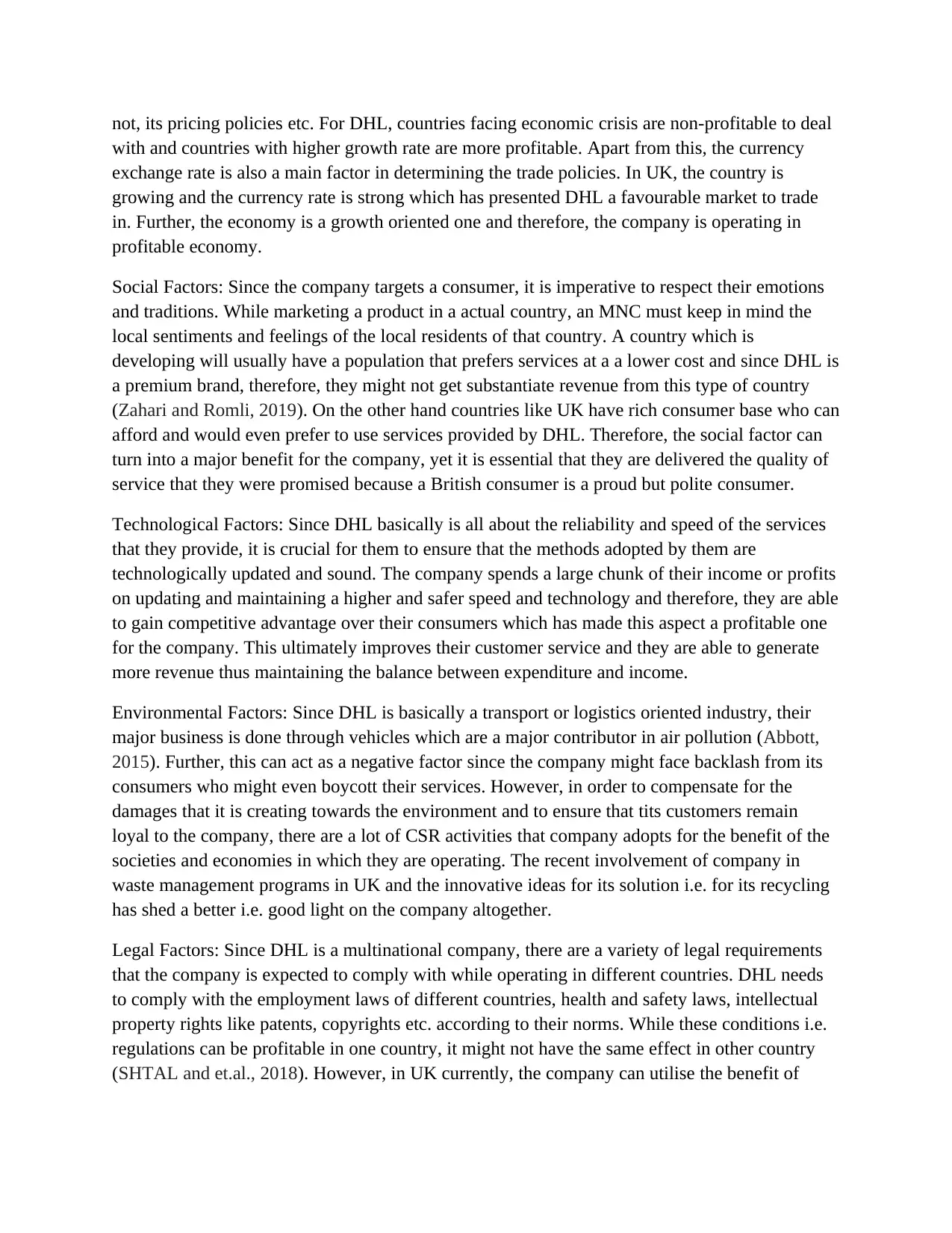
not, its pricing policies etc. For DHL, countries facing economic crisis are non-profitable to deal
with and countries with higher growth rate are more profitable. Apart from this, the currency
exchange rate is also a main factor in determining the trade policies. In UK, the country is
growing and the currency rate is strong which has presented DHL a favourable market to trade
in. Further, the economy is a growth oriented one and therefore, the company is operating in
profitable economy.
Social Factors: Since the company targets a consumer, it is imperative to respect their emotions
and traditions. While marketing a product in a actual country, an MNC must keep in mind the
local sentiments and feelings of the local residents of that country. A country which is
developing will usually have a population that prefers services at a a lower cost and since DHL is
a premium brand, therefore, they might not get substantiate revenue from this type of country
(Zahari and Romli, 2019). On the other hand countries like UK have rich consumer base who can
afford and would even prefer to use services provided by DHL. Therefore, the social factor can
turn into a major benefit for the company, yet it is essential that they are delivered the quality of
service that they were promised because a British consumer is a proud but polite consumer.
Technological Factors: Since DHL basically is all about the reliability and speed of the services
that they provide, it is crucial for them to ensure that the methods adopted by them are
technologically updated and sound. The company spends a large chunk of their income or profits
on updating and maintaining a higher and safer speed and technology and therefore, they are able
to gain competitive advantage over their consumers which has made this aspect a profitable one
for the company. This ultimately improves their customer service and they are able to generate
more revenue thus maintaining the balance between expenditure and income.
Environmental Factors: Since DHL is basically a transport or logistics oriented industry, their
major business is done through vehicles which are a major contributor in air pollution (Abbott,
2015). Further, this can act as a negative factor since the company might face backlash from its
consumers who might even boycott their services. However, in order to compensate for the
damages that it is creating towards the environment and to ensure that tits customers remain
loyal to the company, there are a lot of CSR activities that company adopts for the benefit of the
societies and economies in which they are operating. The recent involvement of company in
waste management programs in UK and the innovative ideas for its solution i.e. for its recycling
has shed a better i.e. good light on the company altogether.
Legal Factors: Since DHL is a multinational company, there are a variety of legal requirements
that the company is expected to comply with while operating in different countries. DHL needs
to comply with the employment laws of different countries, health and safety laws, intellectual
property rights like patents, copyrights etc. according to their norms. While these conditions i.e.
regulations can be profitable in one country, it might not have the same effect in other country
(SHTAL and et.al., 2018). However, in UK currently, the company can utilise the benefit of
with and countries with higher growth rate are more profitable. Apart from this, the currency
exchange rate is also a main factor in determining the trade policies. In UK, the country is
growing and the currency rate is strong which has presented DHL a favourable market to trade
in. Further, the economy is a growth oriented one and therefore, the company is operating in
profitable economy.
Social Factors: Since the company targets a consumer, it is imperative to respect their emotions
and traditions. While marketing a product in a actual country, an MNC must keep in mind the
local sentiments and feelings of the local residents of that country. A country which is
developing will usually have a population that prefers services at a a lower cost and since DHL is
a premium brand, therefore, they might not get substantiate revenue from this type of country
(Zahari and Romli, 2019). On the other hand countries like UK have rich consumer base who can
afford and would even prefer to use services provided by DHL. Therefore, the social factor can
turn into a major benefit for the company, yet it is essential that they are delivered the quality of
service that they were promised because a British consumer is a proud but polite consumer.
Technological Factors: Since DHL basically is all about the reliability and speed of the services
that they provide, it is crucial for them to ensure that the methods adopted by them are
technologically updated and sound. The company spends a large chunk of their income or profits
on updating and maintaining a higher and safer speed and technology and therefore, they are able
to gain competitive advantage over their consumers which has made this aspect a profitable one
for the company. This ultimately improves their customer service and they are able to generate
more revenue thus maintaining the balance between expenditure and income.
Environmental Factors: Since DHL is basically a transport or logistics oriented industry, their
major business is done through vehicles which are a major contributor in air pollution (Abbott,
2015). Further, this can act as a negative factor since the company might face backlash from its
consumers who might even boycott their services. However, in order to compensate for the
damages that it is creating towards the environment and to ensure that tits customers remain
loyal to the company, there are a lot of CSR activities that company adopts for the benefit of the
societies and economies in which they are operating. The recent involvement of company in
waste management programs in UK and the innovative ideas for its solution i.e. for its recycling
has shed a better i.e. good light on the company altogether.
Legal Factors: Since DHL is a multinational company, there are a variety of legal requirements
that the company is expected to comply with while operating in different countries. DHL needs
to comply with the employment laws of different countries, health and safety laws, intellectual
property rights like patents, copyrights etc. according to their norms. While these conditions i.e.
regulations can be profitable in one country, it might not have the same effect in other country
(SHTAL and et.al., 2018). However, in UK currently, the company can utilise the benefit of
⊘ This is a preview!⊘
Do you want full access?
Subscribe today to unlock all pages.

Trusted by 1+ million students worldwide
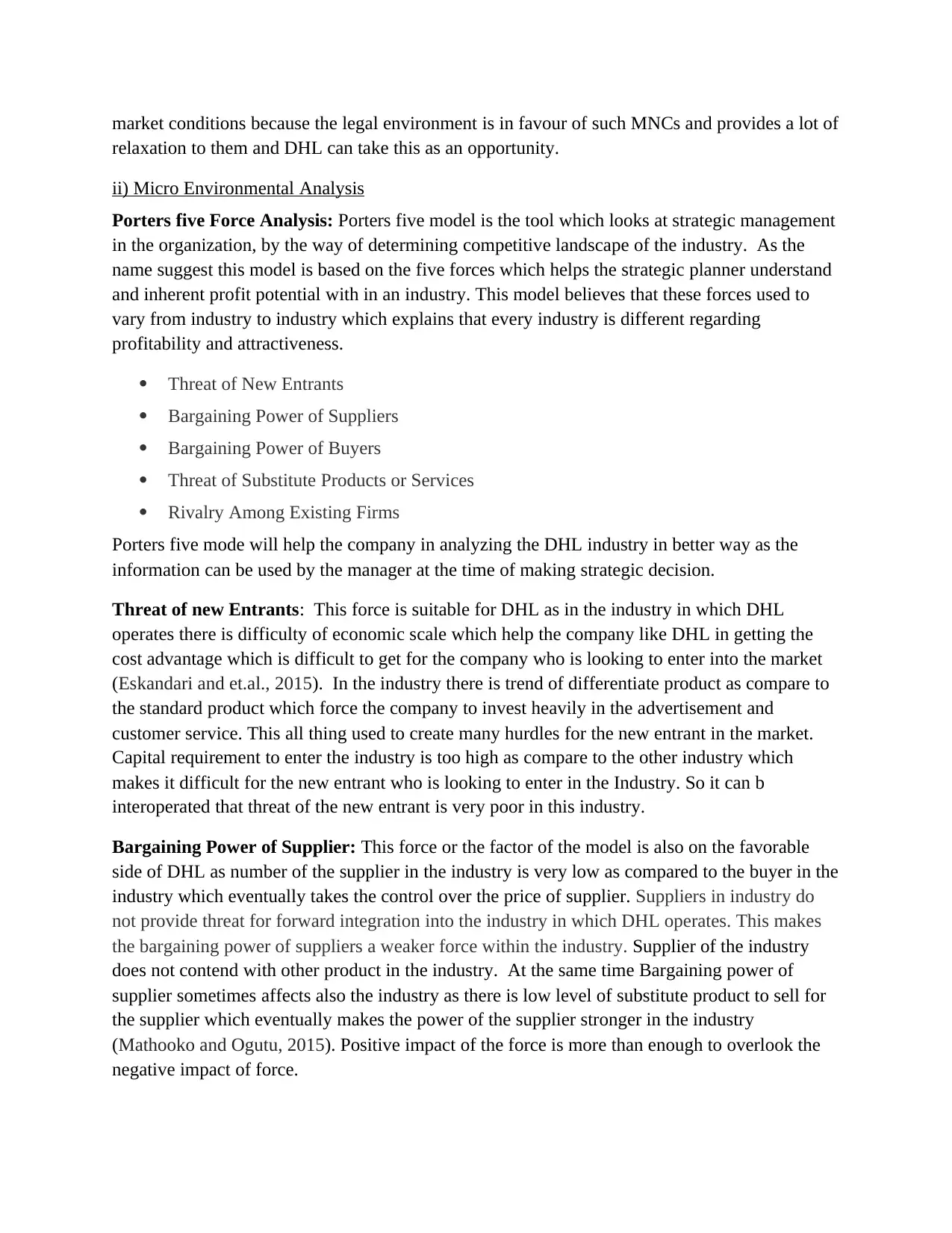
market conditions because the legal environment is in favour of such MNCs and provides a lot of
relaxation to them and DHL can take this as an opportunity.
ii) Micro Environmental Analysis
Porters five Force Analysis: Porters five model is the tool which looks at strategic management
in the organization, by the way of determining competitive landscape of the industry. As the
name suggest this model is based on the five forces which helps the strategic planner understand
and inherent profit potential with in an industry. This model believes that these forces used to
vary from industry to industry which explains that every industry is different regarding
profitability and attractiveness.
Threat of New Entrants
Bargaining Power of Suppliers
Bargaining Power of Buyers
Threat of Substitute Products or Services
Rivalry Among Existing Firms
Porters five mode will help the company in analyzing the DHL industry in better way as the
information can be used by the manager at the time of making strategic decision.
Threat of new Entrants: This force is suitable for DHL as in the industry in which DHL
operates there is difficulty of economic scale which help the company like DHL in getting the
cost advantage which is difficult to get for the company who is looking to enter into the market
(Eskandari and et.al., 2015). In the industry there is trend of differentiate product as compare to
the standard product which force the company to invest heavily in the advertisement and
customer service. This all thing used to create many hurdles for the new entrant in the market.
Capital requirement to enter the industry is too high as compare to the other industry which
makes it difficult for the new entrant who is looking to enter in the Industry. So it can b
interoperated that threat of the new entrant is very poor in this industry.
Bargaining Power of Supplier: This force or the factor of the model is also on the favorable
side of DHL as number of the supplier in the industry is very low as compared to the buyer in the
industry which eventually takes the control over the price of supplier. Suppliers in industry do
not provide threat for forward integration into the industry in which DHL operates. This makes
the bargaining power of suppliers a weaker force within the industry. Supplier of the industry
does not contend with other product in the industry. At the same time Bargaining power of
supplier sometimes affects also the industry as there is low level of substitute product to sell for
the supplier which eventually makes the power of the supplier stronger in the industry
(Mathooko and Ogutu, 2015). Positive impact of the force is more than enough to overlook the
negative impact of force.
relaxation to them and DHL can take this as an opportunity.
ii) Micro Environmental Analysis
Porters five Force Analysis: Porters five model is the tool which looks at strategic management
in the organization, by the way of determining competitive landscape of the industry. As the
name suggest this model is based on the five forces which helps the strategic planner understand
and inherent profit potential with in an industry. This model believes that these forces used to
vary from industry to industry which explains that every industry is different regarding
profitability and attractiveness.
Threat of New Entrants
Bargaining Power of Suppliers
Bargaining Power of Buyers
Threat of Substitute Products or Services
Rivalry Among Existing Firms
Porters five mode will help the company in analyzing the DHL industry in better way as the
information can be used by the manager at the time of making strategic decision.
Threat of new Entrants: This force is suitable for DHL as in the industry in which DHL
operates there is difficulty of economic scale which help the company like DHL in getting the
cost advantage which is difficult to get for the company who is looking to enter into the market
(Eskandari and et.al., 2015). In the industry there is trend of differentiate product as compare to
the standard product which force the company to invest heavily in the advertisement and
customer service. This all thing used to create many hurdles for the new entrant in the market.
Capital requirement to enter the industry is too high as compare to the other industry which
makes it difficult for the new entrant who is looking to enter in the Industry. So it can b
interoperated that threat of the new entrant is very poor in this industry.
Bargaining Power of Supplier: This force or the factor of the model is also on the favorable
side of DHL as number of the supplier in the industry is very low as compared to the buyer in the
industry which eventually takes the control over the price of supplier. Suppliers in industry do
not provide threat for forward integration into the industry in which DHL operates. This makes
the bargaining power of suppliers a weaker force within the industry. Supplier of the industry
does not contend with other product in the industry. At the same time Bargaining power of
supplier sometimes affects also the industry as there is low level of substitute product to sell for
the supplier which eventually makes the power of the supplier stronger in the industry
(Mathooko and Ogutu, 2015). Positive impact of the force is more than enough to overlook the
negative impact of force.
Paraphrase This Document
Need a fresh take? Get an instant paraphrase of this document with our AI Paraphraser
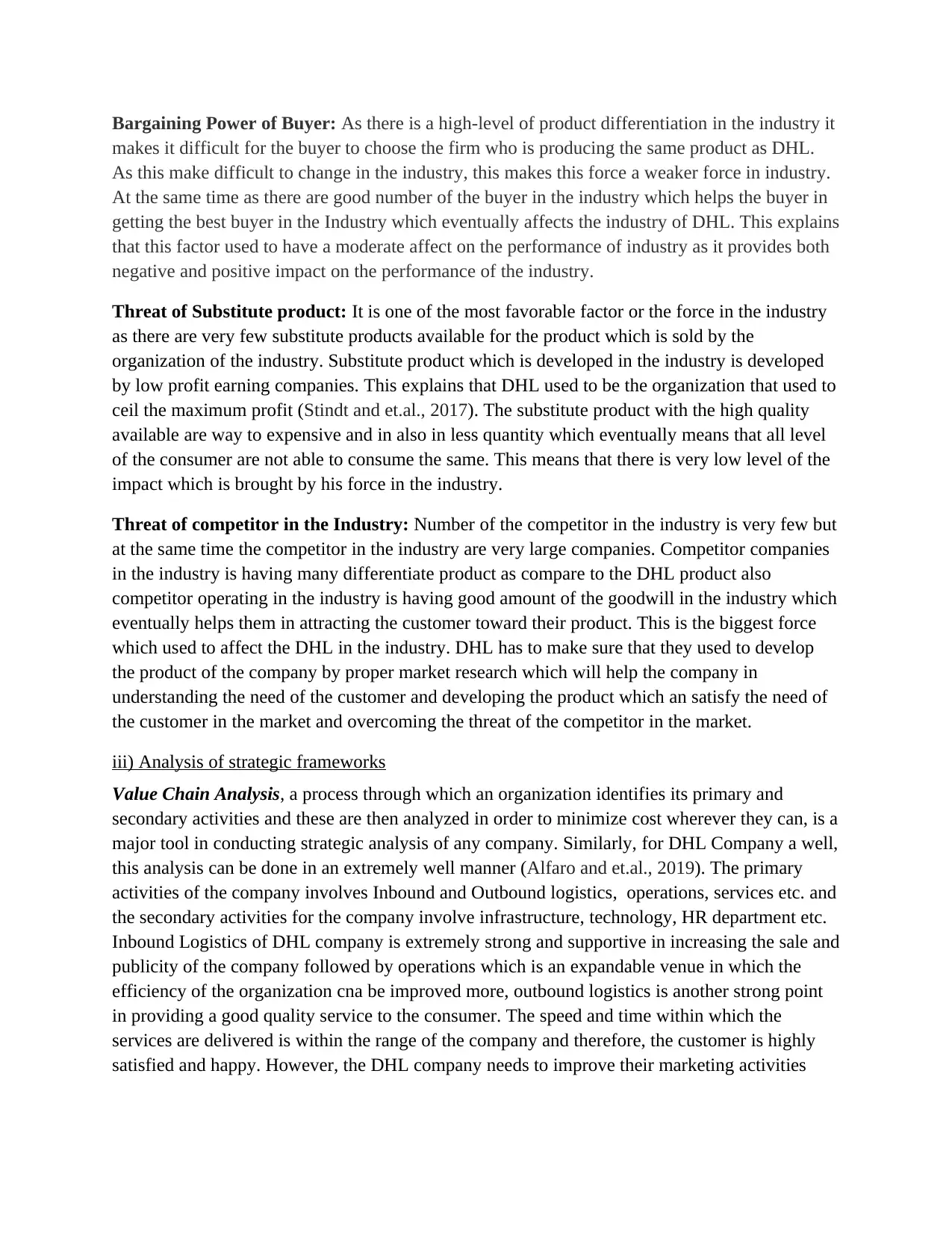
Bargaining Power of Buyer: As there is a high-level of product differentiation in the industry it
makes it difficult for the buyer to choose the firm who is producing the same product as DHL.
As this make difficult to change in the industry, this makes this force a weaker force in industry.
At the same time as there are good number of the buyer in the industry which helps the buyer in
getting the best buyer in the Industry which eventually affects the industry of DHL. This explains
that this factor used to have a moderate affect on the performance of industry as it provides both
negative and positive impact on the performance of the industry.
Threat of Substitute product: It is one of the most favorable factor or the force in the industry
as there are very few substitute products available for the product which is sold by the
organization of the industry. Substitute product which is developed in the industry is developed
by low profit earning companies. This explains that DHL used to be the organization that used to
ceil the maximum profit (Stindt and et.al., 2017). The substitute product with the high quality
available are way to expensive and in also in less quantity which eventually means that all level
of the consumer are not able to consume the same. This means that there is very low level of the
impact which is brought by his force in the industry.
Threat of competitor in the Industry: Number of the competitor in the industry is very few but
at the same time the competitor in the industry are very large companies. Competitor companies
in the industry is having many differentiate product as compare to the DHL product also
competitor operating in the industry is having good amount of the goodwill in the industry which
eventually helps them in attracting the customer toward their product. This is the biggest force
which used to affect the DHL in the industry. DHL has to make sure that they used to develop
the product of the company by proper market research which will help the company in
understanding the need of the customer and developing the product which an satisfy the need of
the customer in the market and overcoming the threat of the competitor in the market.
iii) Analysis of strategic frameworks
Value Chain Analysis, a process through which an organization identifies its primary and
secondary activities and these are then analyzed in order to minimize cost wherever they can, is a
major tool in conducting strategic analysis of any company. Similarly, for DHL Company a well,
this analysis can be done in an extremely well manner (Alfaro and et.al., 2019). The primary
activities of the company involves Inbound and Outbound logistics, operations, services etc. and
the secondary activities for the company involve infrastructure, technology, HR department etc.
Inbound Logistics of DHL company is extremely strong and supportive in increasing the sale and
publicity of the company followed by operations which is an expandable venue in which the
efficiency of the organization cna be improved more, outbound logistics is another strong point
in providing a good quality service to the consumer. The speed and time within which the
services are delivered is within the range of the company and therefore, the customer is highly
satisfied and happy. However, the DHL company needs to improve their marketing activities
makes it difficult for the buyer to choose the firm who is producing the same product as DHL.
As this make difficult to change in the industry, this makes this force a weaker force in industry.
At the same time as there are good number of the buyer in the industry which helps the buyer in
getting the best buyer in the Industry which eventually affects the industry of DHL. This explains
that this factor used to have a moderate affect on the performance of industry as it provides both
negative and positive impact on the performance of the industry.
Threat of Substitute product: It is one of the most favorable factor or the force in the industry
as there are very few substitute products available for the product which is sold by the
organization of the industry. Substitute product which is developed in the industry is developed
by low profit earning companies. This explains that DHL used to be the organization that used to
ceil the maximum profit (Stindt and et.al., 2017). The substitute product with the high quality
available are way to expensive and in also in less quantity which eventually means that all level
of the consumer are not able to consume the same. This means that there is very low level of the
impact which is brought by his force in the industry.
Threat of competitor in the Industry: Number of the competitor in the industry is very few but
at the same time the competitor in the industry are very large companies. Competitor companies
in the industry is having many differentiate product as compare to the DHL product also
competitor operating in the industry is having good amount of the goodwill in the industry which
eventually helps them in attracting the customer toward their product. This is the biggest force
which used to affect the DHL in the industry. DHL has to make sure that they used to develop
the product of the company by proper market research which will help the company in
understanding the need of the customer and developing the product which an satisfy the need of
the customer in the market and overcoming the threat of the competitor in the market.
iii) Analysis of strategic frameworks
Value Chain Analysis, a process through which an organization identifies its primary and
secondary activities and these are then analyzed in order to minimize cost wherever they can, is a
major tool in conducting strategic analysis of any company. Similarly, for DHL Company a well,
this analysis can be done in an extremely well manner (Alfaro and et.al., 2019). The primary
activities of the company involves Inbound and Outbound logistics, operations, services etc. and
the secondary activities for the company involve infrastructure, technology, HR department etc.
Inbound Logistics of DHL company is extremely strong and supportive in increasing the sale and
publicity of the company followed by operations which is an expandable venue in which the
efficiency of the organization cna be improved more, outbound logistics is another strong point
in providing a good quality service to the consumer. The speed and time within which the
services are delivered is within the range of the company and therefore, the customer is highly
satisfied and happy. However, the DHL company needs to improve their marketing activities
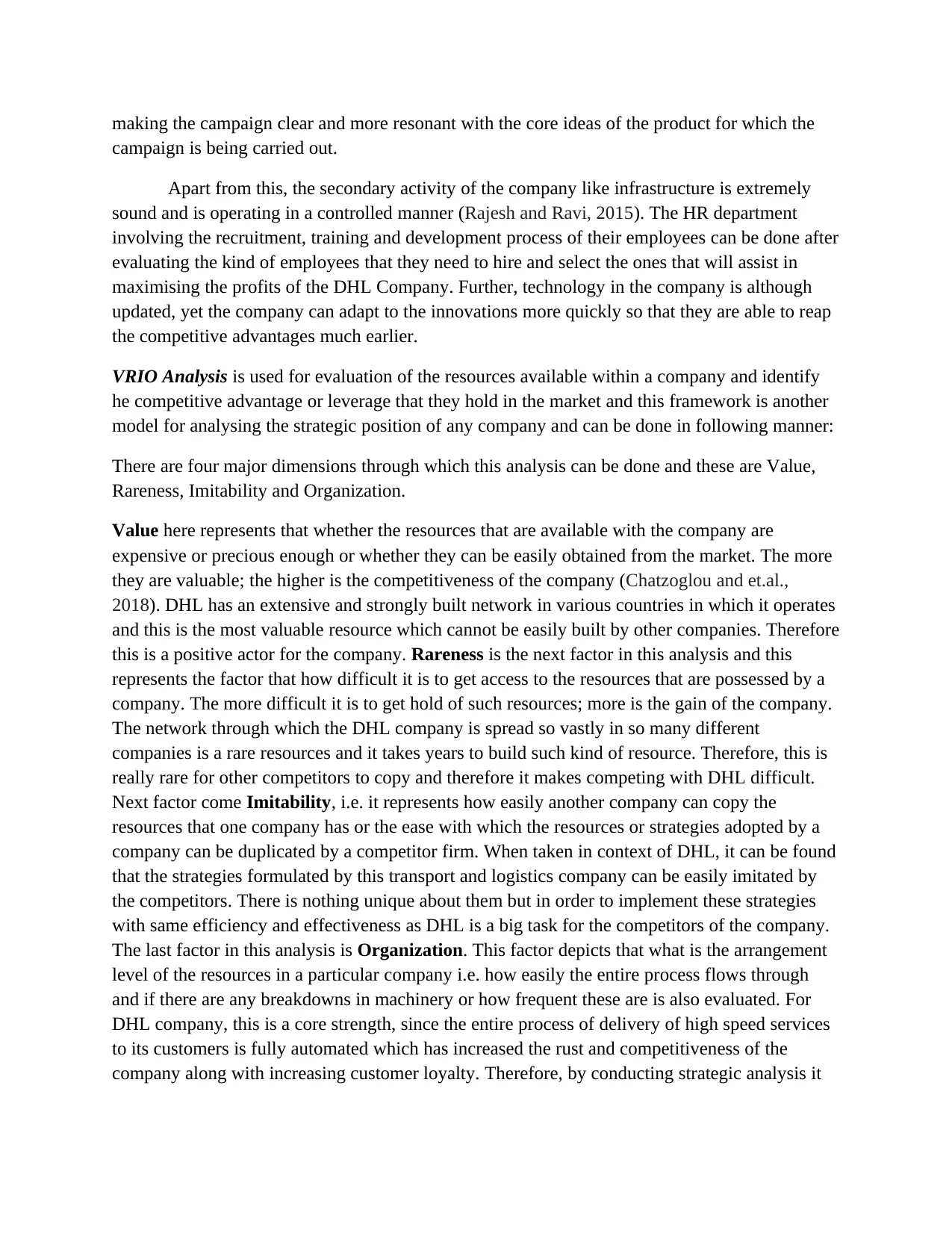
making the campaign clear and more resonant with the core ideas of the product for which the
campaign is being carried out.
Apart from this, the secondary activity of the company like infrastructure is extremely
sound and is operating in a controlled manner (Rajesh and Ravi, 2015). The HR department
involving the recruitment, training and development process of their employees can be done after
evaluating the kind of employees that they need to hire and select the ones that will assist in
maximising the profits of the DHL Company. Further, technology in the company is although
updated, yet the company can adapt to the innovations more quickly so that they are able to reap
the competitive advantages much earlier.
VRIO Analysis is used for evaluation of the resources available within a company and identify
he competitive advantage or leverage that they hold in the market and this framework is another
model for analysing the strategic position of any company and can be done in following manner:
There are four major dimensions through which this analysis can be done and these are Value,
Rareness, Imitability and Organization.
Value here represents that whether the resources that are available with the company are
expensive or precious enough or whether they can be easily obtained from the market. The more
they are valuable; the higher is the competitiveness of the company (Chatzoglou and et.al.,
2018). DHL has an extensive and strongly built network in various countries in which it operates
and this is the most valuable resource which cannot be easily built by other companies. Therefore
this is a positive actor for the company. Rareness is the next factor in this analysis and this
represents the factor that how difficult it is to get access to the resources that are possessed by a
company. The more difficult it is to get hold of such resources; more is the gain of the company.
The network through which the DHL company is spread so vastly in so many different
companies is a rare resources and it takes years to build such kind of resource. Therefore, this is
really rare for other competitors to copy and therefore it makes competing with DHL difficult.
Next factor come Imitability, i.e. it represents how easily another company can copy the
resources that one company has or the ease with which the resources or strategies adopted by a
company can be duplicated by a competitor firm. When taken in context of DHL, it can be found
that the strategies formulated by this transport and logistics company can be easily imitated by
the competitors. There is nothing unique about them but in order to implement these strategies
with same efficiency and effectiveness as DHL is a big task for the competitors of the company.
The last factor in this analysis is Organization. This factor depicts that what is the arrangement
level of the resources in a particular company i.e. how easily the entire process flows through
and if there are any breakdowns in machinery or how frequent these are is also evaluated. For
DHL company, this is a core strength, since the entire process of delivery of high speed services
to its customers is fully automated which has increased the rust and competitiveness of the
company along with increasing customer loyalty. Therefore, by conducting strategic analysis it
campaign is being carried out.
Apart from this, the secondary activity of the company like infrastructure is extremely
sound and is operating in a controlled manner (Rajesh and Ravi, 2015). The HR department
involving the recruitment, training and development process of their employees can be done after
evaluating the kind of employees that they need to hire and select the ones that will assist in
maximising the profits of the DHL Company. Further, technology in the company is although
updated, yet the company can adapt to the innovations more quickly so that they are able to reap
the competitive advantages much earlier.
VRIO Analysis is used for evaluation of the resources available within a company and identify
he competitive advantage or leverage that they hold in the market and this framework is another
model for analysing the strategic position of any company and can be done in following manner:
There are four major dimensions through which this analysis can be done and these are Value,
Rareness, Imitability and Organization.
Value here represents that whether the resources that are available with the company are
expensive or precious enough or whether they can be easily obtained from the market. The more
they are valuable; the higher is the competitiveness of the company (Chatzoglou and et.al.,
2018). DHL has an extensive and strongly built network in various countries in which it operates
and this is the most valuable resource which cannot be easily built by other companies. Therefore
this is a positive actor for the company. Rareness is the next factor in this analysis and this
represents the factor that how difficult it is to get access to the resources that are possessed by a
company. The more difficult it is to get hold of such resources; more is the gain of the company.
The network through which the DHL company is spread so vastly in so many different
companies is a rare resources and it takes years to build such kind of resource. Therefore, this is
really rare for other competitors to copy and therefore it makes competing with DHL difficult.
Next factor come Imitability, i.e. it represents how easily another company can copy the
resources that one company has or the ease with which the resources or strategies adopted by a
company can be duplicated by a competitor firm. When taken in context of DHL, it can be found
that the strategies formulated by this transport and logistics company can be easily imitated by
the competitors. There is nothing unique about them but in order to implement these strategies
with same efficiency and effectiveness as DHL is a big task for the competitors of the company.
The last factor in this analysis is Organization. This factor depicts that what is the arrangement
level of the resources in a particular company i.e. how easily the entire process flows through
and if there are any breakdowns in machinery or how frequent these are is also evaluated. For
DHL company, this is a core strength, since the entire process of delivery of high speed services
to its customers is fully automated which has increased the rust and competitiveness of the
company along with increasing customer loyalty. Therefore, by conducting strategic analysis it
⊘ This is a preview!⊘
Do you want full access?
Subscribe today to unlock all pages.

Trusted by 1+ million students worldwide
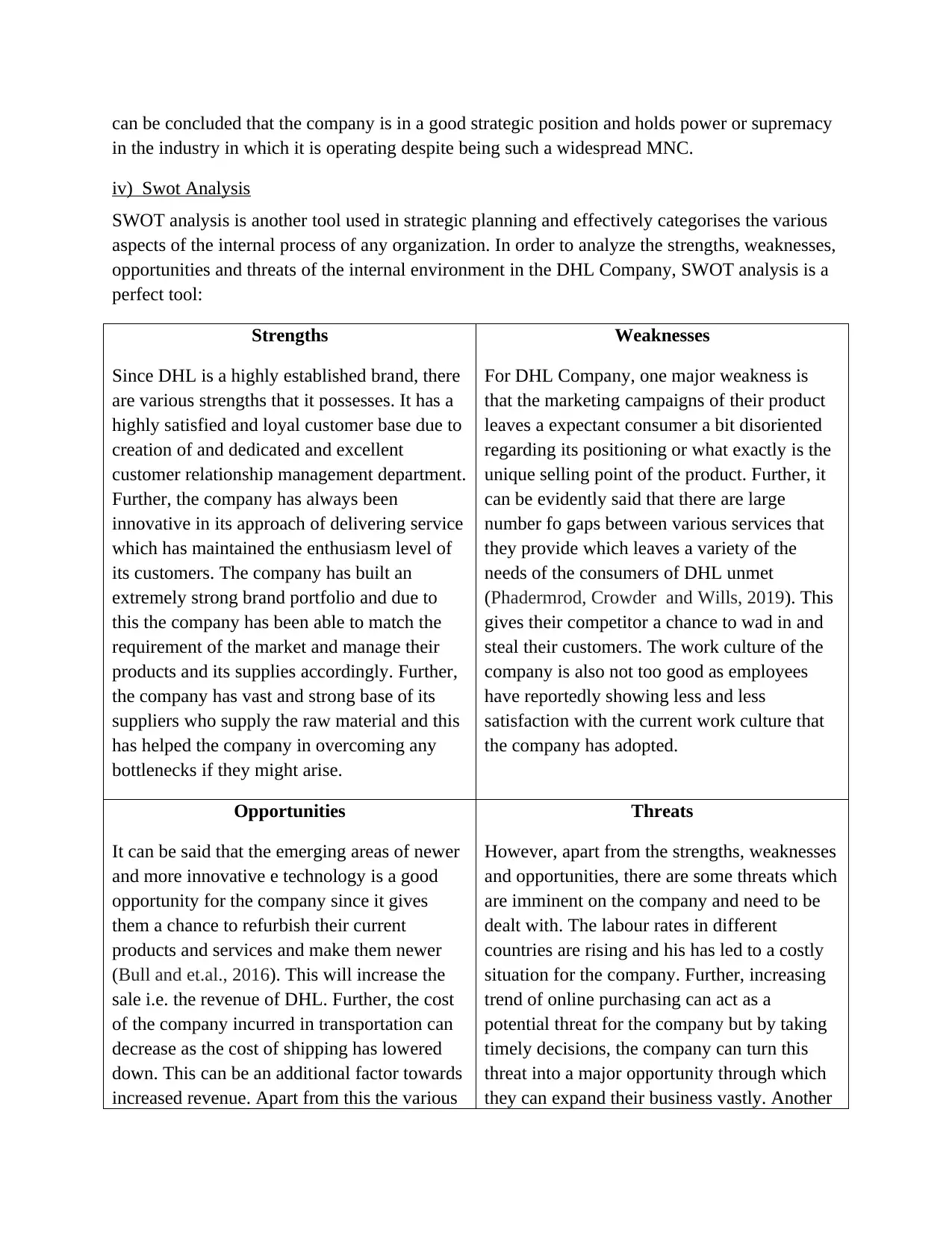
can be concluded that the company is in a good strategic position and holds power or supremacy
in the industry in which it is operating despite being such a widespread MNC.
iv) Swot Analysis
SWOT analysis is another tool used in strategic planning and effectively categorises the various
aspects of the internal process of any organization. In order to analyze the strengths, weaknesses,
opportunities and threats of the internal environment in the DHL Company, SWOT analysis is a
perfect tool:
Strengths
Since DHL is a highly established brand, there
are various strengths that it possesses. It has a
highly satisfied and loyal customer base due to
creation of and dedicated and excellent
customer relationship management department.
Further, the company has always been
innovative in its approach of delivering service
which has maintained the enthusiasm level of
its customers. The company has built an
extremely strong brand portfolio and due to
this the company has been able to match the
requirement of the market and manage their
products and its supplies accordingly. Further,
the company has vast and strong base of its
suppliers who supply the raw material and this
has helped the company in overcoming any
bottlenecks if they might arise.
Weaknesses
For DHL Company, one major weakness is
that the marketing campaigns of their product
leaves a expectant consumer a bit disoriented
regarding its positioning or what exactly is the
unique selling point of the product. Further, it
can be evidently said that there are large
number fo gaps between various services that
they provide which leaves a variety of the
needs of the consumers of DHL unmet
(Phadermrod, Crowder and Wills, 2019). This
gives their competitor a chance to wad in and
steal their customers. The work culture of the
company is also not too good as employees
have reportedly showing less and less
satisfaction with the current work culture that
the company has adopted.
Opportunities
It can be said that the emerging areas of newer
and more innovative e technology is a good
opportunity for the company since it gives
them a chance to refurbish their current
products and services and make them newer
(Bull and et.al., 2016). This will increase the
sale i.e. the revenue of DHL. Further, the cost
of the company incurred in transportation can
decrease as the cost of shipping has lowered
down. This can be an additional factor towards
increased revenue. Apart from this the various
Threats
However, apart from the strengths, weaknesses
and opportunities, there are some threats which
are imminent on the company and need to be
dealt with. The labour rates in different
countries are rising and his has led to a costly
situation for the company. Further, increasing
trend of online purchasing can act as a
potential threat for the company but by taking
timely decisions, the company can turn this
threat into a major opportunity through which
they can expand their business vastly. Another
in the industry in which it is operating despite being such a widespread MNC.
iv) Swot Analysis
SWOT analysis is another tool used in strategic planning and effectively categorises the various
aspects of the internal process of any organization. In order to analyze the strengths, weaknesses,
opportunities and threats of the internal environment in the DHL Company, SWOT analysis is a
perfect tool:
Strengths
Since DHL is a highly established brand, there
are various strengths that it possesses. It has a
highly satisfied and loyal customer base due to
creation of and dedicated and excellent
customer relationship management department.
Further, the company has always been
innovative in its approach of delivering service
which has maintained the enthusiasm level of
its customers. The company has built an
extremely strong brand portfolio and due to
this the company has been able to match the
requirement of the market and manage their
products and its supplies accordingly. Further,
the company has vast and strong base of its
suppliers who supply the raw material and this
has helped the company in overcoming any
bottlenecks if they might arise.
Weaknesses
For DHL Company, one major weakness is
that the marketing campaigns of their product
leaves a expectant consumer a bit disoriented
regarding its positioning or what exactly is the
unique selling point of the product. Further, it
can be evidently said that there are large
number fo gaps between various services that
they provide which leaves a variety of the
needs of the consumers of DHL unmet
(Phadermrod, Crowder and Wills, 2019). This
gives their competitor a chance to wad in and
steal their customers. The work culture of the
company is also not too good as employees
have reportedly showing less and less
satisfaction with the current work culture that
the company has adopted.
Opportunities
It can be said that the emerging areas of newer
and more innovative e technology is a good
opportunity for the company since it gives
them a chance to refurbish their current
products and services and make them newer
(Bull and et.al., 2016). This will increase the
sale i.e. the revenue of DHL. Further, the cost
of the company incurred in transportation can
decrease as the cost of shipping has lowered
down. This can be an additional factor towards
increased revenue. Apart from this the various
Threats
However, apart from the strengths, weaknesses
and opportunities, there are some threats which
are imminent on the company and need to be
dealt with. The labour rates in different
countries are rising and his has led to a costly
situation for the company. Further, increasing
trend of online purchasing can act as a
potential threat for the company but by taking
timely decisions, the company can turn this
threat into a major opportunity through which
they can expand their business vastly. Another
Paraphrase This Document
Need a fresh take? Get an instant paraphrase of this document with our AI Paraphraser
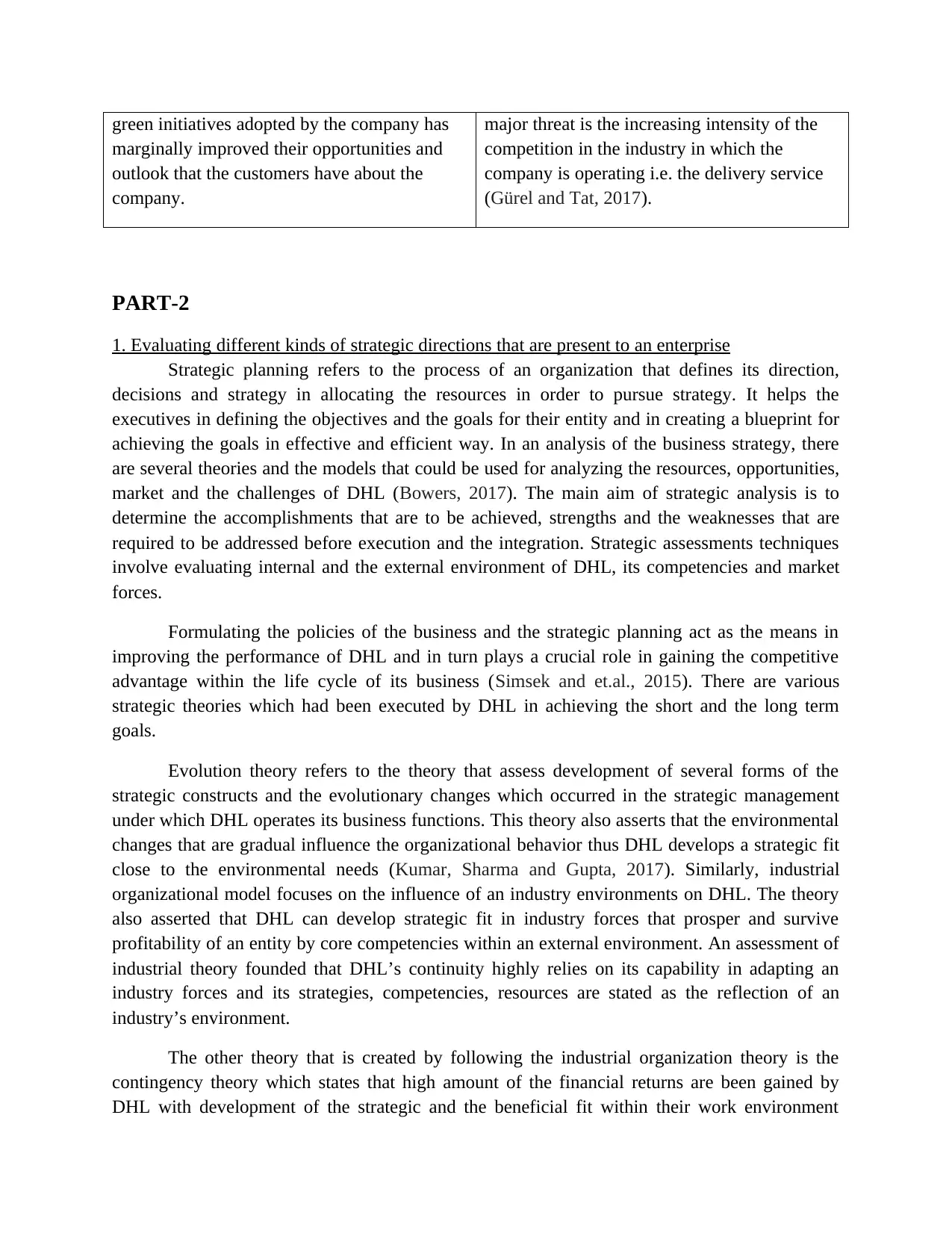
green initiatives adopted by the company has
marginally improved their opportunities and
outlook that the customers have about the
company.
major threat is the increasing intensity of the
competition in the industry in which the
company is operating i.e. the delivery service
(Gürel and Tat, 2017).
PART-2
1. Evaluating different kinds of strategic directions that are present to an enterprise
Strategic planning refers to the process of an organization that defines its direction,
decisions and strategy in allocating the resources in order to pursue strategy. It helps the
executives in defining the objectives and the goals for their entity and in creating a blueprint for
achieving the goals in effective and efficient way. In an analysis of the business strategy, there
are several theories and the models that could be used for analyzing the resources, opportunities,
market and the challenges of DHL (Bowers, 2017). The main aim of strategic analysis is to
determine the accomplishments that are to be achieved, strengths and the weaknesses that are
required to be addressed before execution and the integration. Strategic assessments techniques
involve evaluating internal and the external environment of DHL, its competencies and market
forces.
Formulating the policies of the business and the strategic planning act as the means in
improving the performance of DHL and in turn plays a crucial role in gaining the competitive
advantage within the life cycle of its business (Simsek and et.al., 2015). There are various
strategic theories which had been executed by DHL in achieving the short and the long term
goals.
Evolution theory refers to the theory that assess development of several forms of the
strategic constructs and the evolutionary changes which occurred in the strategic management
under which DHL operates its business functions. This theory also asserts that the environmental
changes that are gradual influence the organizational behavior thus DHL develops a strategic fit
close to the environmental needs (Kumar, Sharma and Gupta, 2017). Similarly, industrial
organizational model focuses on the influence of an industry environments on DHL. The theory
also asserted that DHL can develop strategic fit in industry forces that prosper and survive
profitability of an entity by core competencies within an external environment. An assessment of
industrial theory founded that DHL’s continuity highly relies on its capability in adapting an
industry forces and its strategies, competencies, resources are stated as the reflection of an
industry’s environment.
The other theory that is created by following the industrial organization theory is the
contingency theory which states that high amount of the financial returns are been gained by
DHL with development of the strategic and the beneficial fit within their work environment
marginally improved their opportunities and
outlook that the customers have about the
company.
major threat is the increasing intensity of the
competition in the industry in which the
company is operating i.e. the delivery service
(Gürel and Tat, 2017).
PART-2
1. Evaluating different kinds of strategic directions that are present to an enterprise
Strategic planning refers to the process of an organization that defines its direction,
decisions and strategy in allocating the resources in order to pursue strategy. It helps the
executives in defining the objectives and the goals for their entity and in creating a blueprint for
achieving the goals in effective and efficient way. In an analysis of the business strategy, there
are several theories and the models that could be used for analyzing the resources, opportunities,
market and the challenges of DHL (Bowers, 2017). The main aim of strategic analysis is to
determine the accomplishments that are to be achieved, strengths and the weaknesses that are
required to be addressed before execution and the integration. Strategic assessments techniques
involve evaluating internal and the external environment of DHL, its competencies and market
forces.
Formulating the policies of the business and the strategic planning act as the means in
improving the performance of DHL and in turn plays a crucial role in gaining the competitive
advantage within the life cycle of its business (Simsek and et.al., 2015). There are various
strategic theories which had been executed by DHL in achieving the short and the long term
goals.
Evolution theory refers to the theory that assess development of several forms of the
strategic constructs and the evolutionary changes which occurred in the strategic management
under which DHL operates its business functions. This theory also asserts that the environmental
changes that are gradual influence the organizational behavior thus DHL develops a strategic fit
close to the environmental needs (Kumar, Sharma and Gupta, 2017). Similarly, industrial
organizational model focuses on the influence of an industry environments on DHL. The theory
also asserted that DHL can develop strategic fit in industry forces that prosper and survive
profitability of an entity by core competencies within an external environment. An assessment of
industrial theory founded that DHL’s continuity highly relies on its capability in adapting an
industry forces and its strategies, competencies, resources are stated as the reflection of an
industry’s environment.
The other theory that is created by following the industrial organization theory is the
contingency theory which states that high amount of the financial returns are been gained by
DHL with development of the strategic and the beneficial fit within their work environment
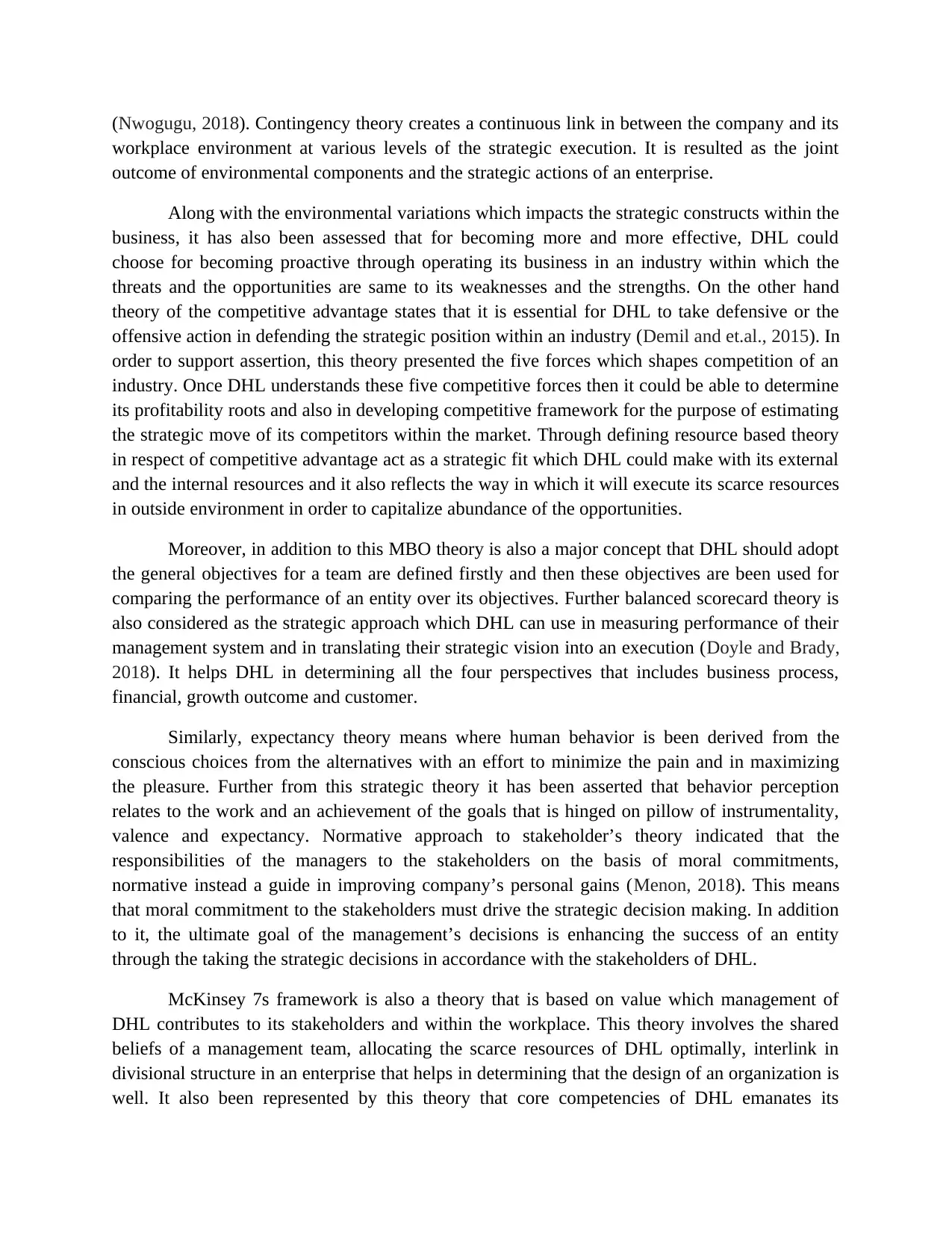
(Nwogugu, 2018). Contingency theory creates a continuous link in between the company and its
workplace environment at various levels of the strategic execution. It is resulted as the joint
outcome of environmental components and the strategic actions of an enterprise.
Along with the environmental variations which impacts the strategic constructs within the
business, it has also been assessed that for becoming more and more effective, DHL could
choose for becoming proactive through operating its business in an industry within which the
threats and the opportunities are same to its weaknesses and the strengths. On the other hand
theory of the competitive advantage states that it is essential for DHL to take defensive or the
offensive action in defending the strategic position within an industry (Demil and et.al., 2015). In
order to support assertion, this theory presented the five forces which shapes competition of an
industry. Once DHL understands these five competitive forces then it could be able to determine
its profitability roots and also in developing competitive framework for the purpose of estimating
the strategic move of its competitors within the market. Through defining resource based theory
in respect of competitive advantage act as a strategic fit which DHL could make with its external
and the internal resources and it also reflects the way in which it will execute its scarce resources
in outside environment in order to capitalize abundance of the opportunities.
Moreover, in addition to this MBO theory is also a major concept that DHL should adopt
the general objectives for a team are defined firstly and then these objectives are been used for
comparing the performance of an entity over its objectives. Further balanced scorecard theory is
also considered as the strategic approach which DHL can use in measuring performance of their
management system and in translating their strategic vision into an execution (Doyle and Brady,
2018). It helps DHL in determining all the four perspectives that includes business process,
financial, growth outcome and customer.
Similarly, expectancy theory means where human behavior is been derived from the
conscious choices from the alternatives with an effort to minimize the pain and in maximizing
the pleasure. Further from this strategic theory it has been asserted that behavior perception
relates to the work and an achievement of the goals that is hinged on pillow of instrumentality,
valence and expectancy. Normative approach to stakeholder’s theory indicated that the
responsibilities of the managers to the stakeholders on the basis of moral commitments,
normative instead a guide in improving company’s personal gains (Menon, 2018). This means
that moral commitment to the stakeholders must drive the strategic decision making. In addition
to it, the ultimate goal of the management’s decisions is enhancing the success of an entity
through the taking the strategic decisions in accordance with the stakeholders of DHL.
McKinsey 7s framework is also a theory that is based on value which management of
DHL contributes to its stakeholders and within the workplace. This theory involves the shared
beliefs of a management team, allocating the scarce resources of DHL optimally, interlink in
divisional structure in an enterprise that helps in determining that the design of an organization is
well. It also been represented by this theory that core competencies of DHL emanates its
workplace environment at various levels of the strategic execution. It is resulted as the joint
outcome of environmental components and the strategic actions of an enterprise.
Along with the environmental variations which impacts the strategic constructs within the
business, it has also been assessed that for becoming more and more effective, DHL could
choose for becoming proactive through operating its business in an industry within which the
threats and the opportunities are same to its weaknesses and the strengths. On the other hand
theory of the competitive advantage states that it is essential for DHL to take defensive or the
offensive action in defending the strategic position within an industry (Demil and et.al., 2015). In
order to support assertion, this theory presented the five forces which shapes competition of an
industry. Once DHL understands these five competitive forces then it could be able to determine
its profitability roots and also in developing competitive framework for the purpose of estimating
the strategic move of its competitors within the market. Through defining resource based theory
in respect of competitive advantage act as a strategic fit which DHL could make with its external
and the internal resources and it also reflects the way in which it will execute its scarce resources
in outside environment in order to capitalize abundance of the opportunities.
Moreover, in addition to this MBO theory is also a major concept that DHL should adopt
the general objectives for a team are defined firstly and then these objectives are been used for
comparing the performance of an entity over its objectives. Further balanced scorecard theory is
also considered as the strategic approach which DHL can use in measuring performance of their
management system and in translating their strategic vision into an execution (Doyle and Brady,
2018). It helps DHL in determining all the four perspectives that includes business process,
financial, growth outcome and customer.
Similarly, expectancy theory means where human behavior is been derived from the
conscious choices from the alternatives with an effort to minimize the pain and in maximizing
the pleasure. Further from this strategic theory it has been asserted that behavior perception
relates to the work and an achievement of the goals that is hinged on pillow of instrumentality,
valence and expectancy. Normative approach to stakeholder’s theory indicated that the
responsibilities of the managers to the stakeholders on the basis of moral commitments,
normative instead a guide in improving company’s personal gains (Menon, 2018). This means
that moral commitment to the stakeholders must drive the strategic decision making. In addition
to it, the ultimate goal of the management’s decisions is enhancing the success of an entity
through the taking the strategic decisions in accordance with the stakeholders of DHL.
McKinsey 7s framework is also a theory that is based on value which management of
DHL contributes to its stakeholders and within the workplace. This theory involves the shared
beliefs of a management team, allocating the scarce resources of DHL optimally, interlink in
divisional structure in an enterprise that helps in determining that the design of an organization is
well. It also been represented by this theory that core competencies of DHL emanates its
⊘ This is a preview!⊘
Do you want full access?
Subscribe today to unlock all pages.

Trusted by 1+ million students worldwide
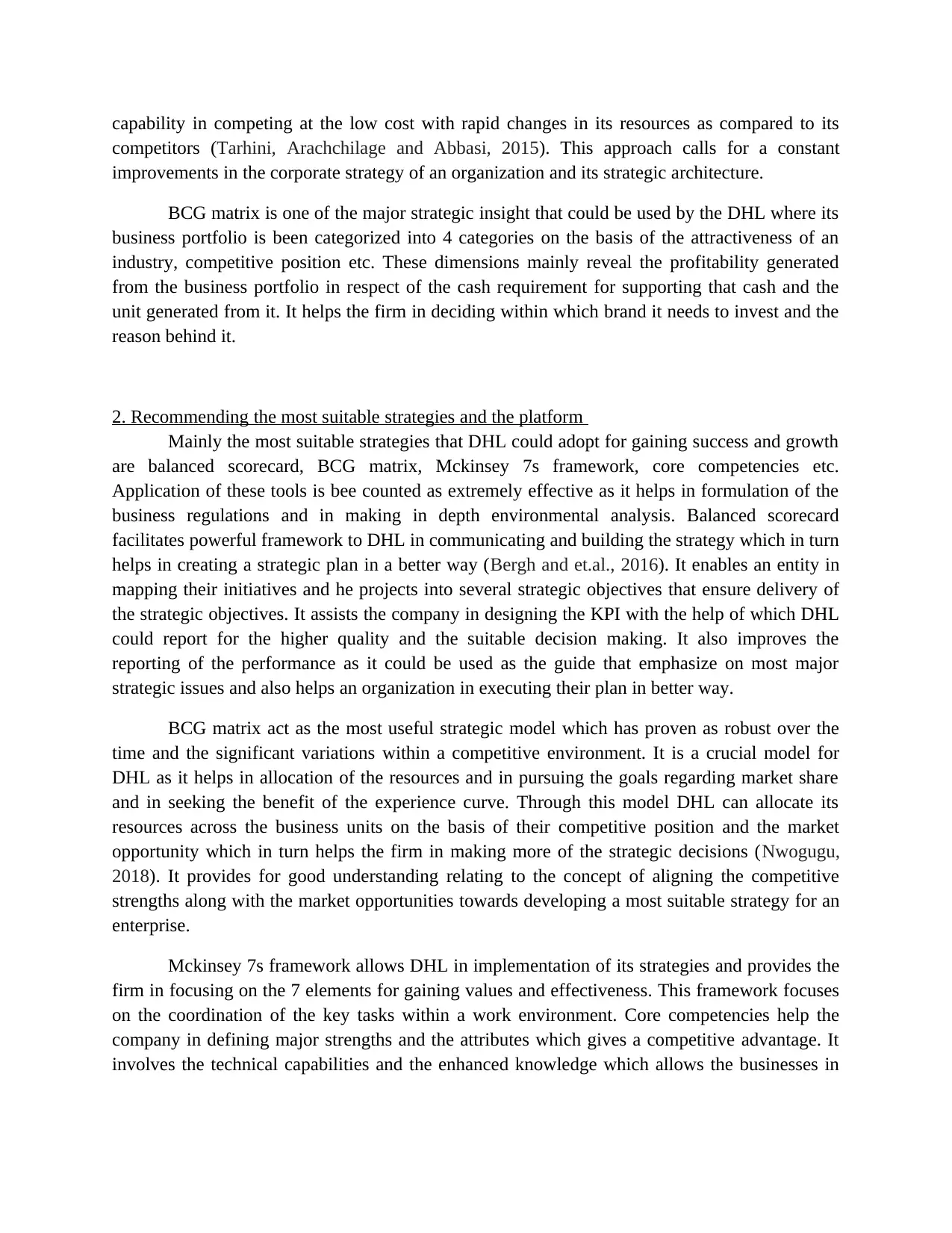
capability in competing at the low cost with rapid changes in its resources as compared to its
competitors (Tarhini, Arachchilage and Abbasi, 2015). This approach calls for a constant
improvements in the corporate strategy of an organization and its strategic architecture.
BCG matrix is one of the major strategic insight that could be used by the DHL where its
business portfolio is been categorized into 4 categories on the basis of the attractiveness of an
industry, competitive position etc. These dimensions mainly reveal the profitability generated
from the business portfolio in respect of the cash requirement for supporting that cash and the
unit generated from it. It helps the firm in deciding within which brand it needs to invest and the
reason behind it.
2. Recommending the most suitable strategies and the platform
Mainly the most suitable strategies that DHL could adopt for gaining success and growth
are balanced scorecard, BCG matrix, Mckinsey 7s framework, core competencies etc.
Application of these tools is bee counted as extremely effective as it helps in formulation of the
business regulations and in making in depth environmental analysis. Balanced scorecard
facilitates powerful framework to DHL in communicating and building the strategy which in turn
helps in creating a strategic plan in a better way (Bergh and et.al., 2016). It enables an entity in
mapping their initiatives and he projects into several strategic objectives that ensure delivery of
the strategic objectives. It assists the company in designing the KPI with the help of which DHL
could report for the higher quality and the suitable decision making. It also improves the
reporting of the performance as it could be used as the guide that emphasize on most major
strategic issues and also helps an organization in executing their plan in better way.
BCG matrix act as the most useful strategic model which has proven as robust over the
time and the significant variations within a competitive environment. It is a crucial model for
DHL as it helps in allocation of the resources and in pursuing the goals regarding market share
and in seeking the benefit of the experience curve. Through this model DHL can allocate its
resources across the business units on the basis of their competitive position and the market
opportunity which in turn helps the firm in making more of the strategic decisions (Nwogugu,
2018). It provides for good understanding relating to the concept of aligning the competitive
strengths along with the market opportunities towards developing a most suitable strategy for an
enterprise.
Mckinsey 7s framework allows DHL in implementation of its strategies and provides the
firm in focusing on the 7 elements for gaining values and effectiveness. This framework focuses
on the coordination of the key tasks within a work environment. Core competencies help the
company in defining major strengths and the attributes which gives a competitive advantage. It
involves the technical capabilities and the enhanced knowledge which allows the businesses in
competitors (Tarhini, Arachchilage and Abbasi, 2015). This approach calls for a constant
improvements in the corporate strategy of an organization and its strategic architecture.
BCG matrix is one of the major strategic insight that could be used by the DHL where its
business portfolio is been categorized into 4 categories on the basis of the attractiveness of an
industry, competitive position etc. These dimensions mainly reveal the profitability generated
from the business portfolio in respect of the cash requirement for supporting that cash and the
unit generated from it. It helps the firm in deciding within which brand it needs to invest and the
reason behind it.
2. Recommending the most suitable strategies and the platform
Mainly the most suitable strategies that DHL could adopt for gaining success and growth
are balanced scorecard, BCG matrix, Mckinsey 7s framework, core competencies etc.
Application of these tools is bee counted as extremely effective as it helps in formulation of the
business regulations and in making in depth environmental analysis. Balanced scorecard
facilitates powerful framework to DHL in communicating and building the strategy which in turn
helps in creating a strategic plan in a better way (Bergh and et.al., 2016). It enables an entity in
mapping their initiatives and he projects into several strategic objectives that ensure delivery of
the strategic objectives. It assists the company in designing the KPI with the help of which DHL
could report for the higher quality and the suitable decision making. It also improves the
reporting of the performance as it could be used as the guide that emphasize on most major
strategic issues and also helps an organization in executing their plan in better way.
BCG matrix act as the most useful strategic model which has proven as robust over the
time and the significant variations within a competitive environment. It is a crucial model for
DHL as it helps in allocation of the resources and in pursuing the goals regarding market share
and in seeking the benefit of the experience curve. Through this model DHL can allocate its
resources across the business units on the basis of their competitive position and the market
opportunity which in turn helps the firm in making more of the strategic decisions (Nwogugu,
2018). It provides for good understanding relating to the concept of aligning the competitive
strengths along with the market opportunities towards developing a most suitable strategy for an
enterprise.
Mckinsey 7s framework allows DHL in implementation of its strategies and provides the
firm in focusing on the 7 elements for gaining values and effectiveness. This framework focuses
on the coordination of the key tasks within a work environment. Core competencies help the
company in defining major strengths and the attributes which gives a competitive advantage. It
involves the technical capabilities and the enhanced knowledge which allows the businesses in
Paraphrase This Document
Need a fresh take? Get an instant paraphrase of this document with our AI Paraphraser
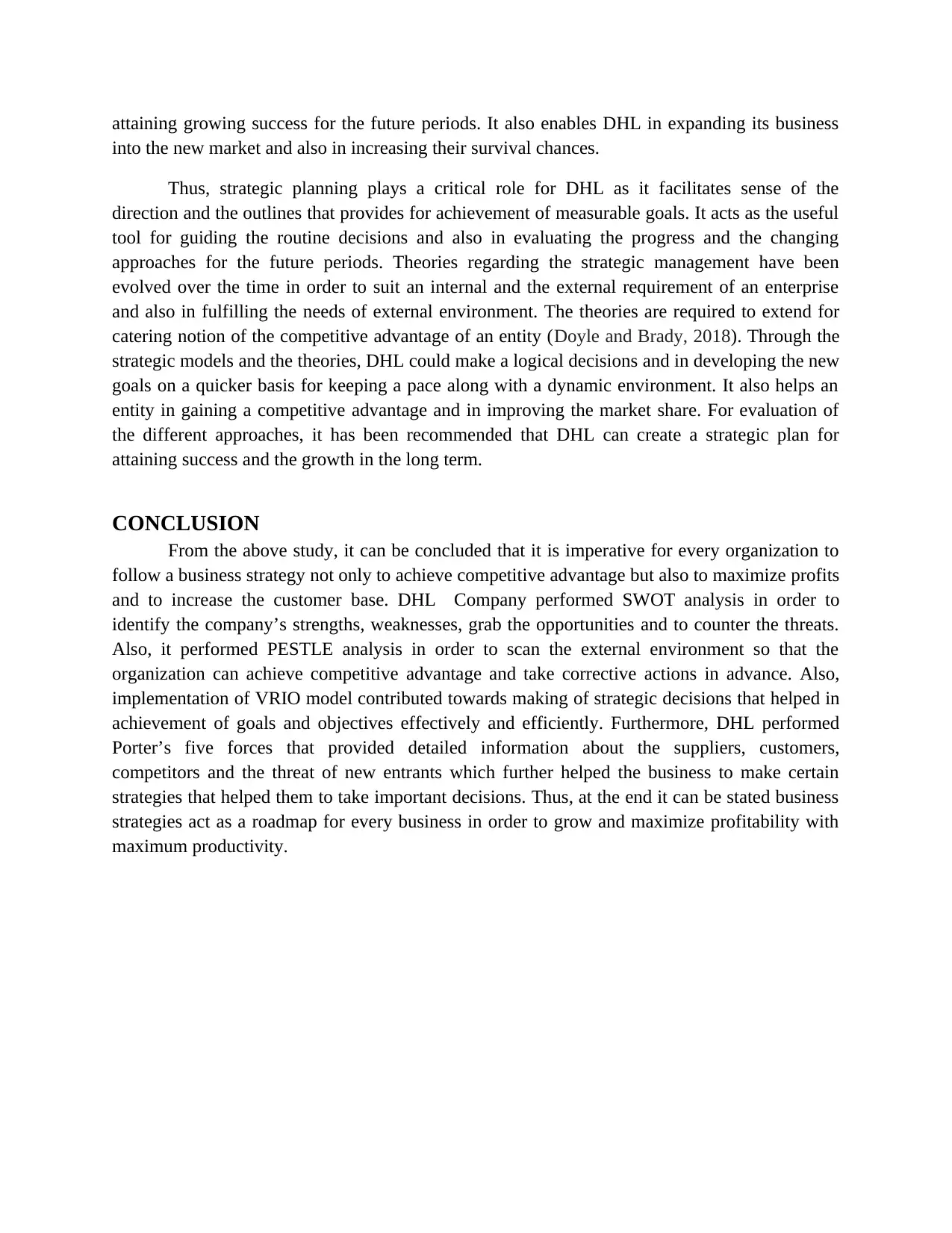
attaining growing success for the future periods. It also enables DHL in expanding its business
into the new market and also in increasing their survival chances.
Thus, strategic planning plays a critical role for DHL as it facilitates sense of the
direction and the outlines that provides for achievement of measurable goals. It acts as the useful
tool for guiding the routine decisions and also in evaluating the progress and the changing
approaches for the future periods. Theories regarding the strategic management have been
evolved over the time in order to suit an internal and the external requirement of an enterprise
and also in fulfilling the needs of external environment. The theories are required to extend for
catering notion of the competitive advantage of an entity (Doyle and Brady, 2018). Through the
strategic models and the theories, DHL could make a logical decisions and in developing the new
goals on a quicker basis for keeping a pace along with a dynamic environment. It also helps an
entity in gaining a competitive advantage and in improving the market share. For evaluation of
the different approaches, it has been recommended that DHL can create a strategic plan for
attaining success and the growth in the long term.
CONCLUSION
From the above study, it can be concluded that it is imperative for every organization to
follow a business strategy not only to achieve competitive advantage but also to maximize profits
and to increase the customer base. DHL Company performed SWOT analysis in order to
identify the company’s strengths, weaknesses, grab the opportunities and to counter the threats.
Also, it performed PESTLE analysis in order to scan the external environment so that the
organization can achieve competitive advantage and take corrective actions in advance. Also,
implementation of VRIO model contributed towards making of strategic decisions that helped in
achievement of goals and objectives effectively and efficiently. Furthermore, DHL performed
Porter’s five forces that provided detailed information about the suppliers, customers,
competitors and the threat of new entrants which further helped the business to make certain
strategies that helped them to take important decisions. Thus, at the end it can be stated business
strategies act as a roadmap for every business in order to grow and maximize profitability with
maximum productivity.
into the new market and also in increasing their survival chances.
Thus, strategic planning plays a critical role for DHL as it facilitates sense of the
direction and the outlines that provides for achievement of measurable goals. It acts as the useful
tool for guiding the routine decisions and also in evaluating the progress and the changing
approaches for the future periods. Theories regarding the strategic management have been
evolved over the time in order to suit an internal and the external requirement of an enterprise
and also in fulfilling the needs of external environment. The theories are required to extend for
catering notion of the competitive advantage of an entity (Doyle and Brady, 2018). Through the
strategic models and the theories, DHL could make a logical decisions and in developing the new
goals on a quicker basis for keeping a pace along with a dynamic environment. It also helps an
entity in gaining a competitive advantage and in improving the market share. For evaluation of
the different approaches, it has been recommended that DHL can create a strategic plan for
attaining success and the growth in the long term.
CONCLUSION
From the above study, it can be concluded that it is imperative for every organization to
follow a business strategy not only to achieve competitive advantage but also to maximize profits
and to increase the customer base. DHL Company performed SWOT analysis in order to
identify the company’s strengths, weaknesses, grab the opportunities and to counter the threats.
Also, it performed PESTLE analysis in order to scan the external environment so that the
organization can achieve competitive advantage and take corrective actions in advance. Also,
implementation of VRIO model contributed towards making of strategic decisions that helped in
achievement of goals and objectives effectively and efficiently. Furthermore, DHL performed
Porter’s five forces that provided detailed information about the suppliers, customers,
competitors and the threat of new entrants which further helped the business to make certain
strategies that helped them to take important decisions. Thus, at the end it can be stated business
strategies act as a roadmap for every business in order to grow and maximize profitability with
maximum productivity.
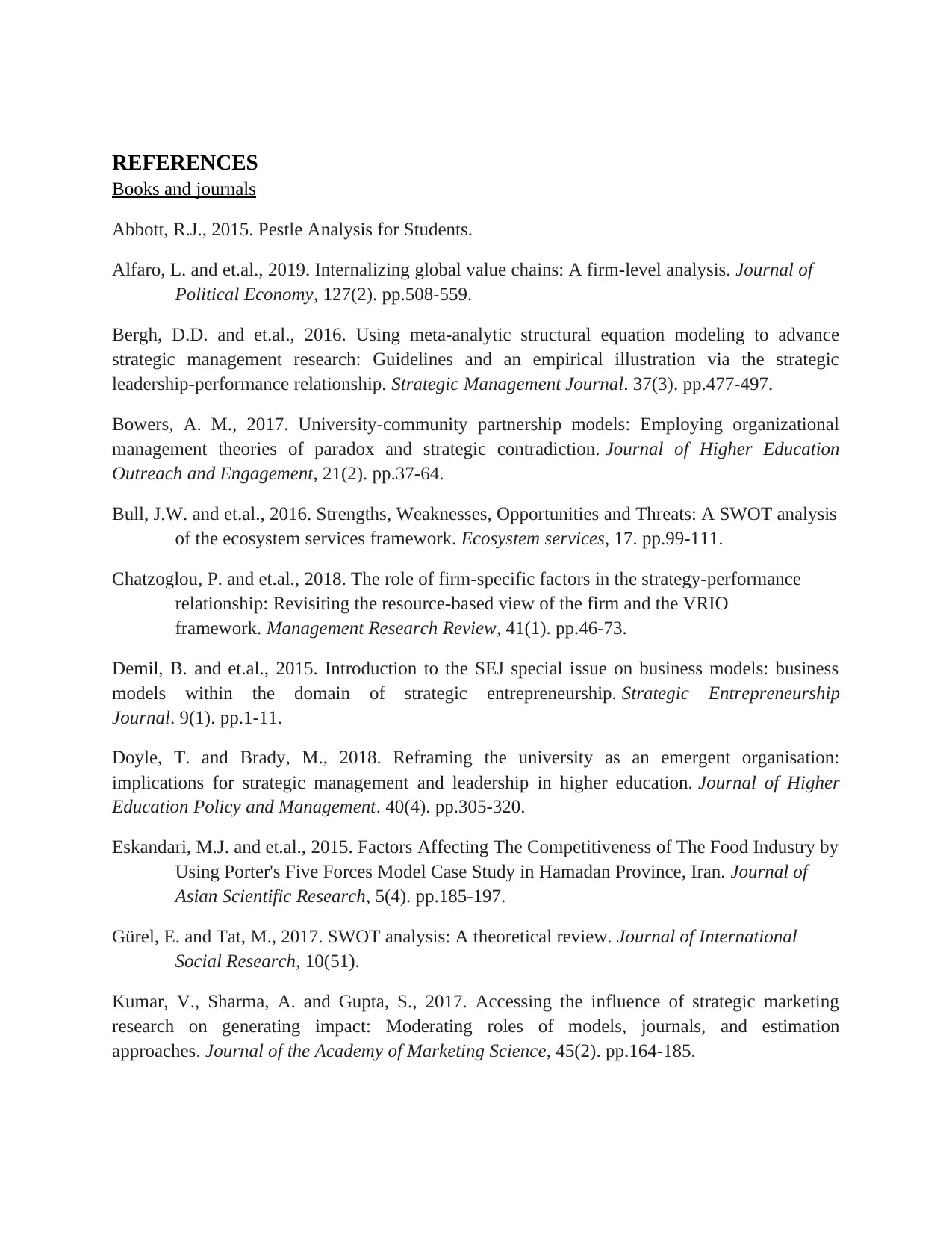
REFERENCES
Books and journals
Abbott, R.J., 2015. Pestle Analysis for Students.
Alfaro, L. and et.al., 2019. Internalizing global value chains: A firm-level analysis. Journal of
Political Economy, 127(2). pp.508-559.
Bergh, D.D. and et.al., 2016. Using meta‐analytic structural equation modeling to advance
strategic management research: Guidelines and an empirical illustration via the strategic
leadership‐performance relationship. Strategic Management Journal. 37(3). pp.477-497.
Bowers, A. M., 2017. University-community partnership models: Employing organizational
management theories of paradox and strategic contradiction. Journal of Higher Education
Outreach and Engagement, 21(2). pp.37-64.
Bull, J.W. and et.al., 2016. Strengths, Weaknesses, Opportunities and Threats: A SWOT analysis
of the ecosystem services framework. Ecosystem services, 17. pp.99-111.
Chatzoglou, P. and et.al., 2018. The role of firm-specific factors in the strategy-performance
relationship: Revisiting the resource-based view of the firm and the VRIO
framework. Management Research Review, 41(1). pp.46-73.
Demil, B. and et.al., 2015. Introduction to the SEJ special issue on business models: business
models within the domain of strategic entrepreneurship. Strategic Entrepreneurship
Journal. 9(1). pp.1-11.
Doyle, T. and Brady, M., 2018. Reframing the university as an emergent organisation:
implications for strategic management and leadership in higher education. Journal of Higher
Education Policy and Management. 40(4). pp.305-320.
Eskandari, M.J. and et.al., 2015. Factors Affecting The Competitiveness of The Food Industry by
Using Porter's Five Forces Model Case Study in Hamadan Province, Iran. Journal of
Asian Scientific Research, 5(4). pp.185-197.
Gürel, E. and Tat, M., 2017. SWOT analysis: A theoretical review. Journal of International
Social Research, 10(51).
Kumar, V., Sharma, A. and Gupta, S., 2017. Accessing the influence of strategic marketing
research on generating impact: Moderating roles of models, journals, and estimation
approaches. Journal of the Academy of Marketing Science, 45(2). pp.164-185.
Books and journals
Abbott, R.J., 2015. Pestle Analysis for Students.
Alfaro, L. and et.al., 2019. Internalizing global value chains: A firm-level analysis. Journal of
Political Economy, 127(2). pp.508-559.
Bergh, D.D. and et.al., 2016. Using meta‐analytic structural equation modeling to advance
strategic management research: Guidelines and an empirical illustration via the strategic
leadership‐performance relationship. Strategic Management Journal. 37(3). pp.477-497.
Bowers, A. M., 2017. University-community partnership models: Employing organizational
management theories of paradox and strategic contradiction. Journal of Higher Education
Outreach and Engagement, 21(2). pp.37-64.
Bull, J.W. and et.al., 2016. Strengths, Weaknesses, Opportunities and Threats: A SWOT analysis
of the ecosystem services framework. Ecosystem services, 17. pp.99-111.
Chatzoglou, P. and et.al., 2018. The role of firm-specific factors in the strategy-performance
relationship: Revisiting the resource-based view of the firm and the VRIO
framework. Management Research Review, 41(1). pp.46-73.
Demil, B. and et.al., 2015. Introduction to the SEJ special issue on business models: business
models within the domain of strategic entrepreneurship. Strategic Entrepreneurship
Journal. 9(1). pp.1-11.
Doyle, T. and Brady, M., 2018. Reframing the university as an emergent organisation:
implications for strategic management and leadership in higher education. Journal of Higher
Education Policy and Management. 40(4). pp.305-320.
Eskandari, M.J. and et.al., 2015. Factors Affecting The Competitiveness of The Food Industry by
Using Porter's Five Forces Model Case Study in Hamadan Province, Iran. Journal of
Asian Scientific Research, 5(4). pp.185-197.
Gürel, E. and Tat, M., 2017. SWOT analysis: A theoretical review. Journal of International
Social Research, 10(51).
Kumar, V., Sharma, A. and Gupta, S., 2017. Accessing the influence of strategic marketing
research on generating impact: Moderating roles of models, journals, and estimation
approaches. Journal of the Academy of Marketing Science, 45(2). pp.164-185.
⊘ This is a preview!⊘
Do you want full access?
Subscribe today to unlock all pages.

Trusted by 1+ million students worldwide
1 out of 13
Related Documents
Your All-in-One AI-Powered Toolkit for Academic Success.
+13062052269
info@desklib.com
Available 24*7 on WhatsApp / Email
![[object Object]](/_next/static/media/star-bottom.7253800d.svg)
Unlock your academic potential
Copyright © 2020–2026 A2Z Services. All Rights Reserved. Developed and managed by ZUCOL.





